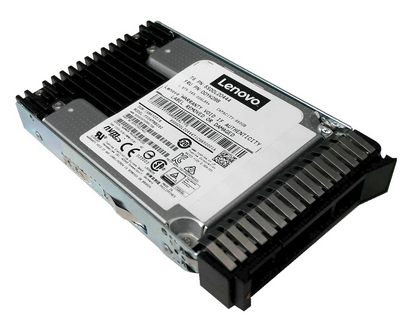 LENOVO SSD PX04PMB 800GB Pci-e 3.0 x4 ThinkSystem U.2 Performance NVMe Hot Swap
LENOVO SSD PX04PMB 800GB Pci-e 3.0 x4 ThinkSystem U.2 Performance NVMe Hot Swap
For personal help or faster delivery
+32 2 558 30 00
Non-Volatile Memory Express (NVMe) is new PCIe 3.0 high performance SSD technology that provides high I/O throughput and low latency. NVMe interfaces remove SAS/SATA bottlenecks and unleash all of the capabilities of contemporary NAND flash memory. Each NVMe PCI SSD has direct PCIe 3.0 x4 connection, which provides at least 2x more bandwidth and 2x less latency than SATA/SAS-based SSD solutions. NVMe drives are also optimized for heavy multi-threaded workloads by using internal parallelism and many other improvements, such as enlarged I/O queues.
The Lenovo PX04PMB NVMe Performance PCIe SSD have the following features:
2.5-inch drive bay (U.2) form factor
Based on the Toshiba PX04P drives, PX04PMBxxx
19nm MLC NAND (128 Gb/die)
10 drive-write-per-day (DWPD) SSD for write-intensive workloads
Direct PCIe 3.0 x4 connection for each NVMe drive, resulting in up to 4 GBps overall throughput.
Full Power-Loss-Protection and End-to-End Data Protection
Low power consumption (maximum 18.5 W)
Enterprise Mainstream SSDs and Enterprise Performance SSDs have similar read and write IOPS performance, but the key difference between them is their endurance (or lifetime) (that is, how long they can perform write operations because SSDs have a finite number of program/erase (P/E) cycles). Enterprise Performance SSDs have higher endurance compared to Enterprise Mainstream SSDs. SSD write endurance is typically measured by the number of program/erase (P/E) cycles that the drive incurs over its lifetime, listed as the total bytes of written data (TBW) in the device specification.
The TBW value assigned to a solid-state device is the total bytes of written data (based on the number of P/E cycles) that a drive can be guaranteed to complete (% of remaining P/E cycles = % of remaining TBW). Reaching this limit does not cause the drive to immediately fail. It simply denotes the maximum number of writes that can be guaranteed. A solid-state device will not fail upon reaching the specified TBW. At some point based on manufacturing variance margin, after surpassing the TBW value, the drive will reach the end-of-life point, at which the drive will go into a read-only mode.
Even though Enterprise Performance SSDs have high endurance, careful planning must still be done to ensure that the total amount of data expected to be written to the drive over its life will not exceed the stated total bytes written (TBW) property of the drive.
For example, the 1.6TB drive has an endurance of 29,200 TB of total bytes written (TBW). This means that for full operation over five years, write workload must be limited to no more than 16TB GB of writes per day, which is equivalent to 10.0 full drive writes per day (DWPD). For the device to last three years, the drive write workload must be limited to no more than 26,667 GB of writes per day, which is equivalent to 16.7 full drive writes per day.

















 FREE Shipping.
FREE Shipping.

